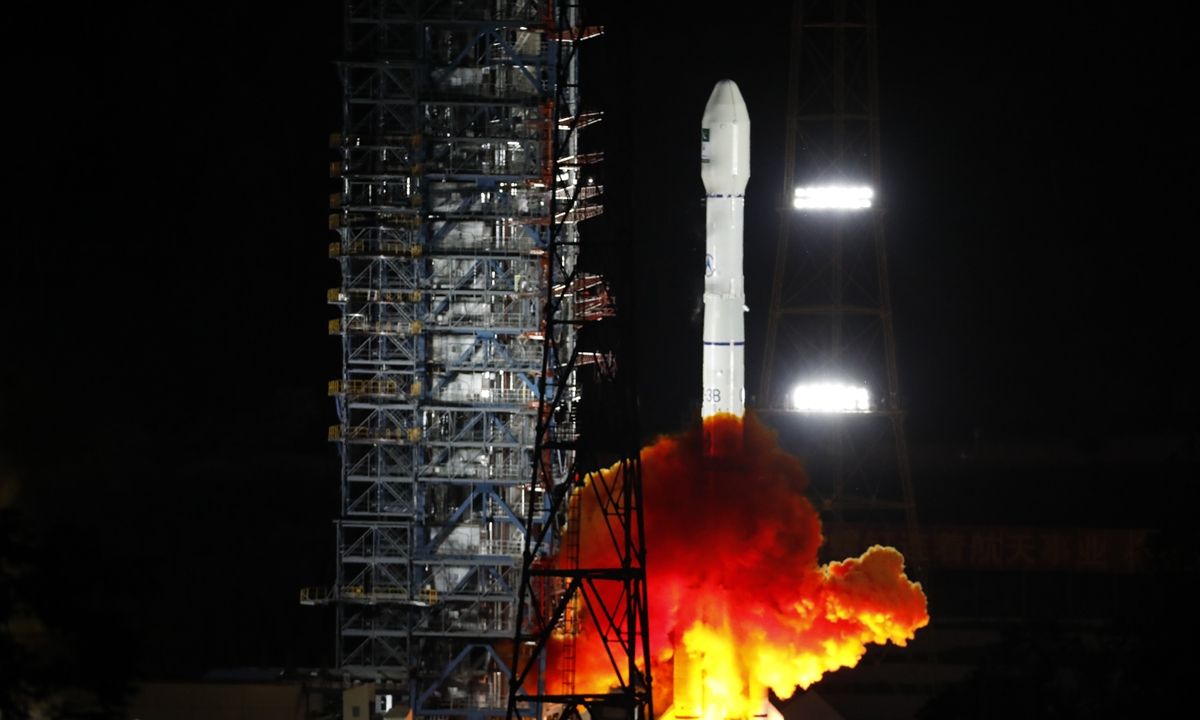China delivers advanced communication satellite to Pakistan following successful launch

Photo: Chen Xiaolong
China successfully launched a Pakistani communication satellite, codenamed PakSat MM1, on Thursday via a Long March 3B carrier rocket from the Xichang Satellite Launch Center in Southwest China's Sichuan Province. Mission insiders hailed the feat as a landmark in technological cooperation between the two countries. They expect the successful deployment of the satellite to significantly boost Pakistan's comprehensive social and economic development, ensure the security of its communications, and enhance its aerospace technology and industrial capabilities.
Additionally, the satellite's launch is anticipated to play a major role in advancing and promoting China's foreign strategies, such as the China-proposed Belt and Road Initiative (BRI) and the accelerated construction of the China-Pakistan Economic Corridor (CPEC), they said.
This satellite project is a milestone in cooperation between China and Pakistan and is expected to revolutionize communication in the country and serve as a giant leap toward a digitally connected Pakistan.
The Pakistan Space and Upper Atmosphere Research Commission, or the SUPARCO told the Global Times that “this high-power multi-mission satellite will provide communication services in C, Ku, Ka Bands and SBAS services in L Band. Based on advanced communication technologies, PakSat-MM1 will play a pivotal role in the socio-economic uplift of the country. It will prove to be a stepping stone in the transformation of the country into Digital Pakistan.”
“It will provide various communication services like broadband internet, and TV broadcasting,” according to Project Manager MM-1, SUPARCO, Usman Iftikhar.
He said that the primary objective behind the PAKSAT MM-1 satellite is to strengthen Pakistan’s communication infrastructure, which would pave the way for broadening the horizons for connectivity, serving the unserved, Tele-education, E-health/Tele-medicine, E-governance and E-commerce while transforming Pakistan into a digital powerhouse.
Both Pakistan and India are influential South Asian countries. India has long received support from the US and Russia, leading to a long-standing advantage over Pakistan in the aerospace field. The PakSat-MM1 project will contribute to the balanced development of space capabilities in the South Asian region and foster long-term cooperation in the aerospace field between China and Pakistan, according to the contractor of the China-Pakistan satellite project, the China Great Wall Industry Corporation (CGWIC,) a subsidiary of the state-owned space giant China Aerospace Science and Technology Corporation (CASC).
As a milestone in China-Pakistan space cooperation, the MM1 project is the third whole-satellite project between CGWIC and Pakistan, following the Paksat-1R and PRSS-1, according to the CGWIC.
The CGWIC provided Pakistan with satellite systems, launch services, ground monitoring and control stations, ground application systems, joint satellite development, technical personnel training, concessional loans for foreign aid, and insurance arrangements. This turnkey project showcases CGWIC as the main international platform for China's aerospace cooperation.
Through joint development, the Chinese firm will train a large number of management and technical personnel with experience in satellite research and manufacturing for Pakistan, establishing a talent pool for Pakistan's independent space development capabilities.
According to the CGWIC, the MM1 project also marked the first international satellite project to adopt BeiDou standards, with BeiDou as the primary augmentation target, achieving the implementation of high-precision BeiDou satellite navigation services.
Existing international satellite-based augmentation systems, such as the US' WAAS, Europe's EGNOS and GALILEO's HAS services, all primarily augment the US' GPS and use GPS spatiotemporal benchmarks. In contrast, the MM1 satellite-based navigation augmentation system is the world's first to adopt the BeiDou spatiotemporal benchmark and to primarily augment the BeiDou system. It also specifically enhances the B2b signal format of BeiDou, broadcasting augmentation service information and providing high-precision positioning services according to CGWIC experts on Thursday.
This marks the first standard output at the system level for the BeiDou satellite navigation system and is a significant milestone in the international development of BeiDou, holding important implications for the international promotion of the BeiDou system, they said.

